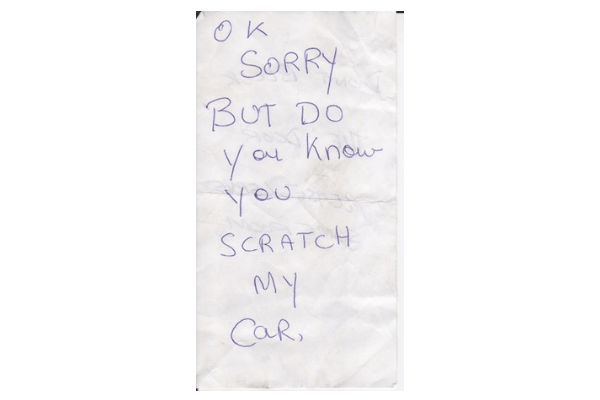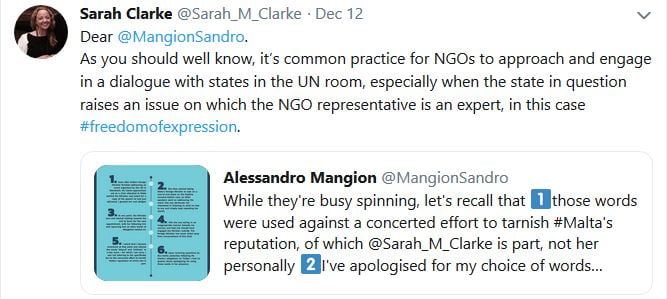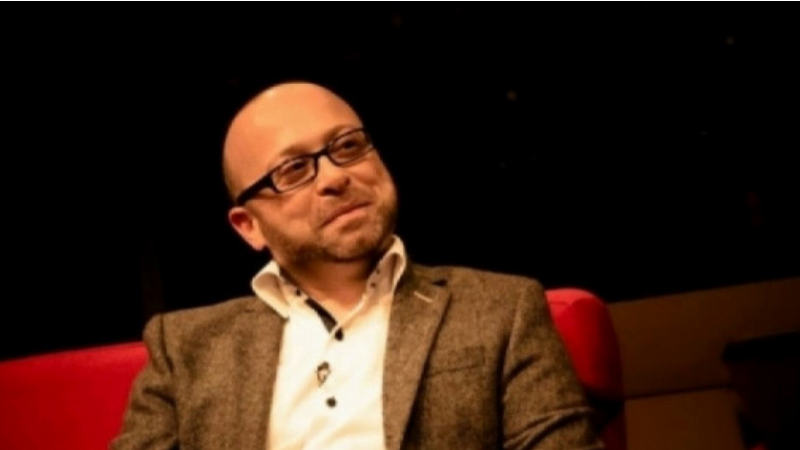“I’m sorry I ruined your shirt.”
“I’m sorry I broke your favourite mug.”
“I’m sorry I said that terrible thing.”
These are examples of apologies. The speaker is expressing regret for something he said or did.
This is an example of a non-apology:

It was scrawled on the back of a torn cigarette package and stuffed into the mailbox of the home I rented in Zejtun.
A car had been parked so close to our only entrance that I could barely get in or out of the house by holding my breath and squeezing my legs through a gap in the metal gate.
Parking in Malta being what it is, this wasn’t an uncommon occurrence. I once had to climb over the gate and through the back of someone’s pickup truck to leave home. But this lady’s car remained wedged up against our door for a week.
I’d left a polite note beneath her windshield wiper asking her to please not do this anymore. Her response was, “Okay, sorry, but do you know you scratch my car.”
Now, it wouldn’t surprise me if the front gate had touched the side of this person’s car at some point, given that she’d parked inches away from it. No doubt it happened when I was struggling to heave a gas cylinder over the blocked railing.
But rather than accept that she’d made a poor decision, this person felt it necessary to point out that she was a victim.
And that’s the first form the “Sorry, but…” non-apology takes in Malta.
It’s a version of whataboutism. A way of deflecting blame. “Okay, sure, I did that, but what about you?”
Unfortunately, a counteraccusation doesn’t absolve one of blame or express regret. It only seeks to deflect responsibility onto someone else.
The second type of “Sorry, but…” non-apology that I see so often in Malta takes the form of a justification.
When Sandro Mangion, the private secretary to Malta’s Foreign Minister Carmelo Abela, non-apologised for swearing at PEN International policy advisor Sarah Clarke, he wasn’t expressing remorse for his actions.
He was digging in his heels and squeezing out a grudging, “Sorry” because someone made him say it.
And then he went on to justify why his vulgar remark was acceptable and had to be taken in context. Clarke asked for it, you see, because she was too persistent with her questioning of the Foreign Minister. And unlike some “news reporters” in Malta, she didn’t accept what he said at face value.
The thing is, calling Clarke a “biased shithole” was unacceptable no matter what the context . Not in the civilised world, at least.

Mangion demonstrated very clearly that he is unfit for a job which requires him to reply to criticism in a clear logical way without losing his temper.
Mangion also demonstrated that he is unfit for employment in a public position where he’s expected to represent Maltese citizens from both sides of the country’s bitter political divide with impartiality and professionalism.
In a normal, functioning Western democracy, this civil servant would make a public apology — without excuses — and tender his resignation.
That won’t happen, of course, because no one resigns in Malta.
Given this intense national allergy to personal responsibility, Foreign Minister Abela has no choice but to fire Mangion. Yes, even if he clings to his desk with both hands and wraps his legs around his chair.
If you insist on retaining this man in his position, at least wash his mouth out with soap and make him stand in the corner until he promises not to embarrass Malta in front of the United Nations again.
And if any help is needed with sorting things out, I can highly recommend my 6th grade teacher Mrs. Adams. We were all afraid of her. She’d make an excellent Person of Trust.
Non-apologies are not expressions of regret. They’re grudging self-justifications.
Have the dignity to own up to your actions in an adult way, and take responsibility for them.












